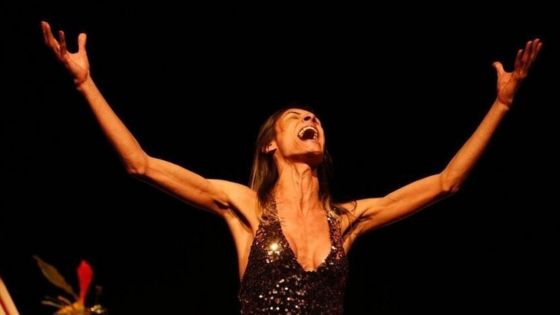
Jesus is standing at the altar in a sparkly gold dress and heels.
Her wavy brown hair falls mid-way down her back. She breaks bread and passes it around the congregation in the pews, some of whom are sipping communion wine too.
Confused? Actress Renata Carvalho is playing the role of Jesus, a transgender Christ who is telling Bible stories with a modern take.
The show - The Gospel According to Jesus, Queen of Heaven - is a monologue written by Scottish playwright Jo Clifford.
In Brazil it is playing to packed audiences and making headlines.
One performance in Sao Paulo state was cancelled because a judge imposed an emergency injunction. It was subsequently lifted.
Other groups tried to shut it down, without success, and the cast has faced online abuse too.
Transphobia
"We were attacked by evangelical churches mostly," says the play`s director, Natalia Mallo.
"With Jesus embodied in a trans woman, it addresses all the oppression and violence suffered by this population."
Ms Mallo says that Brazil is notoriously transphobic. According to Rede Trans, which tracks violence against transgender people, more than 170 transgender people have been killed so far this year.
Ms Mallo recently held a performance in an Anglican church in downtown Sao Paulo, a congregation that has been supportive of the work.
She also invited religious leaders from the city to watch the play and talk about it afterwards.
"We became the focus of a discussion about censorship and about the limits of art," says Ms Mallo.
"We thought it would be a nice way of responding by creating an event that shows that not all Christians are against what we are doing."
Censorship
The play is not alone in facing criticism from more conservative quarters.
Santander Cultural, a cultural centre sponsored by Santander Bank in the city of Porto Alegre, put on an exhibition called Queer Museum in August.
But in September they ended it early after right-wing protestors said the works promoted bestiality and paedophilia.
As well as evangelical leaders, the Free Brazil Movement (MBL) played a part in the protests.
The group describes itself as liberal and in support of free-market ideals. It grew out of protests demanding the impeachment of former president Dilma Rousseff and is gaining momentum.
Artists have criticised MBL for what they say is censorship.
Freedoms curtailed?
But one of its members, Arthur Moledo do Val, who has a popular YouTube Channel called MamaiFalei, disagrees.
"A boycott is an exercise in liberal citizenship because laws aren`t used to censure another person," he says.
"We are against censorship, we support a boycott against an exhibition that society didn`t see as healthy for children."
He does not agree that closing down the exhibition was an attack on freedom of expression.
"We believe in freedom of expression, not only for those people who are in favour of this kind of exhibition, but also for the people who are against it, like me," he says.
"If we as a society are against that kind of exhibition, why can`t we be free to ask an institution to voluntarily close it? That too is freedom of expression is it not?"
Age-restricted
There have also been protests at the Modern Art Museum in Sao Paulo after a child was encouraged to touch a naked man in a piece of performance art.
In light of these protests, the curators at the Sao Paulo Museum of Art, one of the most influential museums in the country, are being extra careful with their new exhibition, Histories of Sexuality.
Some of the works in this exhibition already courted controversy in the Queer Museum.
So for the first time ever, after consulting lawyers, the gallery initially put an 18-and-over age restriction on visitors, something more commonly seen at music shows, plays and public presentations. Last week, they relaxed the rule to allow minors to attend the exhibition if they are accompanied by an adult.
"We`ve been planning this for over two years so it`s not that we decided to do this exhibition because it`s become such a polemic issue," says Adriano Pedrosa, the museum`s artistic director.
"It`s good timing because the exhibition becomes really more relevant for this discussion. We were also fortunate not to be the very first ones so we had time to prepare ourselves, or to try to prepare ourselves."
Pushing the boundaries
The museum`s view is that it is better to be safe than sorry. However, censorship expert Cristina Costa says that while every country has its taboos, art is meant to challenge conventions.
"The problem is that freedom of expression, as it is understood today, is the freedom of those who think like me, not the idea that pluralism exists," says Ms Costa, who is the head of the Communication, Freedom of Expression and Censorship Observatory at the University of Sao Paulo.
"We had a century of authoritarianism, fascism, Nazism, Stalinism and other isms. We`re having a hard time dealing with diversity," she says.
Divided politics
Theatre director Natalia Mallo believes the protests are political.
"This is not meant to protect the family or children from naked people or from art that is inappropriate, this is about elections and gathering people around a narrative that this is bad," she says.
"It`s a way of creating consensus around things that are controversial and where people choose sides."
At the end of her play, there is a round of applause and the audience starts chanting "Out with President Temer".
For many, what is happening in Brazil`s creative spaces is a reflection of the politics here.
And the divide between left and right is set to become even more polarised ahead of general elections, due to take place next year.


0 comments:
Post a Comment